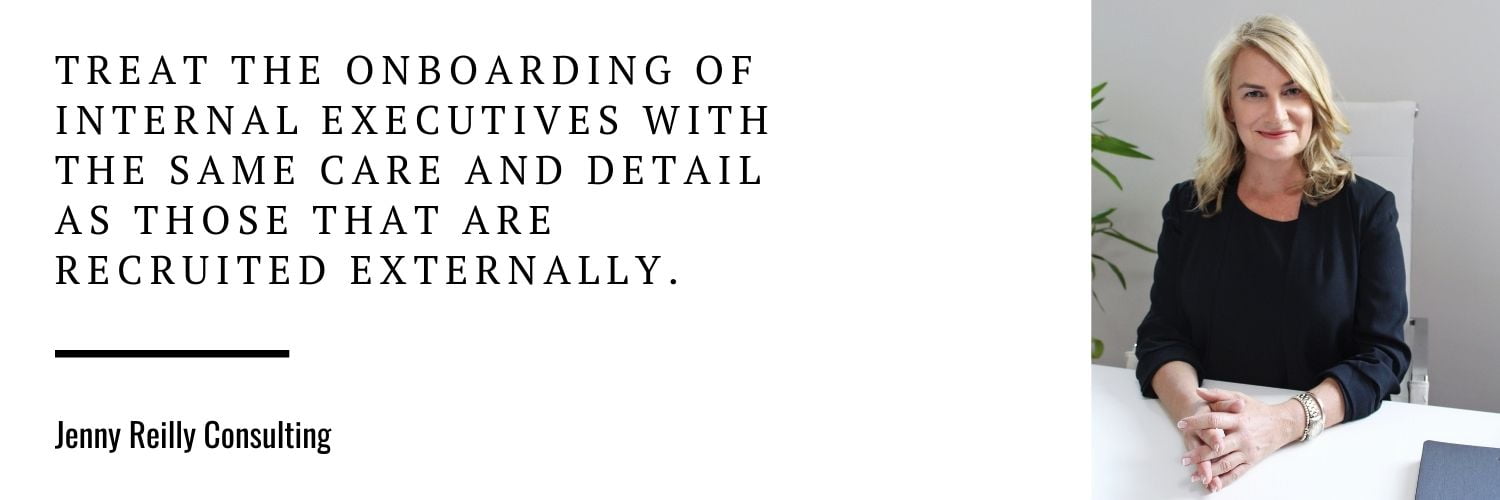Onboarding internal or external senior executives during COVID?
One of the areas I specialize in for executive coaching is the critical transition of internal or external appointed executives. Onboarding during COVID has moved from in-person to virtual; however, the key categories and areas of support required remain the same.
If there is one take away you have from this post; I hope that it is this…

Internal Executive Advancement
Internal applicants who advance into executive positions have different challenges, albeit require the same level of onboarding attention to ensure a smooth and supported transition. They often come into an executive position with an excellent record, know and understand the key players, are well versed in the company culture and strategies, and have a defined view of the changes they feel should be made.
More often than not, internal applicants are not provided with the same level of briefing, support, or strategic communication upon promotion to the executive level. It is assumed they know what is needed and can hit the ground running. That’s why some might need executive coaching.
Providing planned support for an internal incumbent to help them deal with expectations or perceived bias from staff who have worked with them in a previous position can be extremely beneficial in the transition stage. Jenny Reilly Consulting provides executive coaching to assist internal appointments over their first 90 days, define what success will look in the position, develop leadership attributes and skills, and work on the mindset required to make a successful transition to the executive level.
Other areas of focus typically include:
- How to transition into the new role and perform a non-biased (not personal) business review
- Focused identification of the critical business drivers
- Conducting a risk management analysis
- Developing, planning, and implementing a growth strategy
- Promoting a redefined (when necessary) vision
- Issue processing and decision-making strategies
- Timing of new priority roll-outs
- Team building strategies
- Personal branding – how they want to be perceived, communication, and meeting strategies …
- 90-day feedback assessment from internal and external stakeholders

External Executive Appointment
The first 90 days are critical for any new incumbent of a position; it is a time when individuals prove themselves through defining actions. This time is often seen as a predictor of future success or failure, and the importance of a well laid out plan during this period cannot be understated.
There is a great deal of scrutiny when walking into a new role and company. This critical time is when relationships need to be formed, credibility built, early wins attained, and influence levels determined. If time is not spent in the first 90 days familiarizing yourself with the key stakeholders, building relationships and alliances, and learning about the culture and the business environment, it will impede trust, consume energy, and set a negative imprint on your desired direction. If bad decisions are made too quickly, credibility will be lost, leading to resistance to any future ideas being put forward.
A thorough onboarding brief can provide valuable information to assist in the incumbent’s business orientation, stakeholder connections, and expectations alignment.
Within the first 90 days, the individual should be able to:
- Achieve alignment and understanding of strategy, priorities, and business culture
- Build credibility
- Build the team, form alliances and coalitions
- Define priorities to improve organizational performance, and
- Implement self-management tactics, and define how balance can be put in place to ensure success
‘What got you here won’t get you there,’ you have heard this statement before, and yes, it is so very true. Individuals who come into a new environment and try to implement the same tactics and duplicate success they had in their past role do generally not get a lot of kudos. Intentional time is required to be set aside to develop critical relationships and build trust. Taking action too fast, with little input from key players in the organization, will undermine success.
Intelligence, not ego, needs to direct action in a new role. Setting lofty or unattainable goals, from not listening to stakeholders and their needs and expectations, nor paying attention to the organization’s cultural environment are sure ways to alienate employees.

What to Do:
- Learn about the business environment, the operating model, planning systems, KPI’s, planning and evaluation metrics, and talent management. Evaluating performance, understanding the organization’s causes and history will be beneficial and help you form a base of knowledge that will enable you to navigate through pivotal and challenging issues and opportunities.
- Put in the time to develop critical relationships, achieve alignment, and develop supportive and positive alliances.
- Develop and build your team.
- Define how you want to brand yourself in the position. How you want to be perceived, your level of influence, and your stamp will be on the job.
- Develop a strategy based on an informed knowledge of key players and promote to achieve buy-in and support.
- Make good decisions, be transparent in your desire to make changes along with the rationale and benefits. This will increase your credibility and develop greater levels of trust.
- Once you have your background information, support, and back up your decisions in need for change, work towards early wins. This can only be achieved by preparing yourself and putting in the time to learn what you need to in the new environment.
- For every challenging situation, ensure that you spend time investigating the problem, diagnosing the next best step, developing an action plan, and matching your strategy to the specific situation.
- Remember to keep a good balance during your onboarding, the first 90 days can be all-consuming, and if you are not looking after yourself during this period, you risk the potential of making poor decisions.
Moving into an executive position can bring mixed emotions including, excitement, nervousness, anxiety, and vulnerability.
What is needed to bring the new incumbent (whether internal or external to the organization) up to speed more quickly?
What areas do you envisage will be the most challenging, and what measures could you put in place to make this transition smoother in these areas?
What are some of the key milestones that would be expected to be achieved in the first 90 days?
Communicate these in the onboarding material for full transparency.
There are vital areas a new executive should focus on:
- Understanding the vision and strategy of the organization
- Getting to know key people and processes
- Understanding the culture of the organization
- Identifying areas of challenge and opportunity
- Finding out potential areas to avoid or barriers that may impede progress
- Aiming to attain early wins
Navigate the Work Environment with Executive Coaching
Navigating today’s complex work environment and taking control in a new position during a global pandemic is no mean feat. I have worked with multiple clients over the last six months who have successfully onboarded senior-level positions during COVID. These techniques and tips have been instrumental in their success.
The return on investment (ROI) for the support provided through Jenny Reilly Consulting for incoming executives is invaluable. If you are interested in learning more about how the team at Jenny Reilly Consulting can assist in the onboarding of new internal or external executives into your organization, or if you are in the transition phase yourself and need support, please reach out to us on askme@jennyreilly.com or call +1-604-616-1967 to learn more about how we can help you with our executive coaching.












